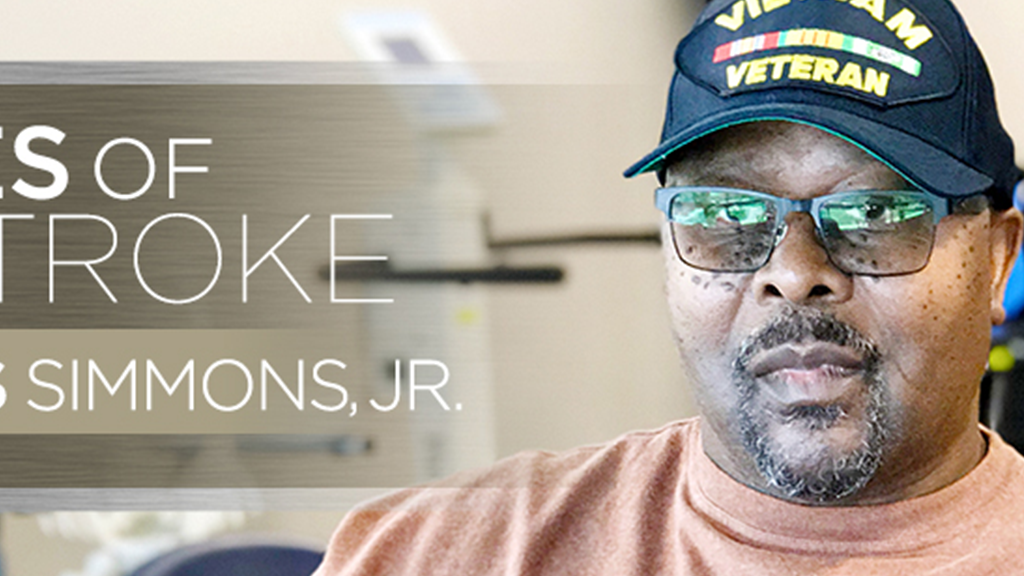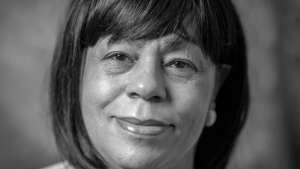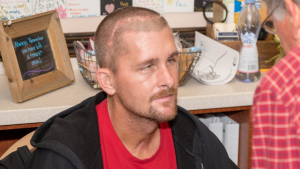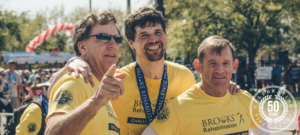The Army Prepared Him to Fight Stroke

Back to physical health resource hub
Moses Simmons, Jr. spent 21 years in the Army. He traveled the world. He fought in Vietnam. He then became an alcohol and drug counselor. All of that helped prepare him for one of the hardest fights of his life.
On September 2, 2015, Moses was working late on the computer. Around 3 a.m. when he finally got into bed, he fell back and didn’t have the strength to sit up. He woke up his wife, Lena, who called 911. Although he was well within the three hour window for tPA treatment, he was not given the blood thinner because the time of his stroke symptoms was recorded incorrectly. There is no way to tell if the outcome would have been different if he had been given the tPA. Moses had no other choice but to move forward. He spent four days at an acute care hospital before transferring to Brooks Rehabilitation Hospital.
Paralyzed on his left side, Moses was unmotivated when he first arrived. He tried to hide himself behind pillows when it was time for therapy. After a few days, his sense of humor started to emerge and this activity turned into a game of hide-and-seek. He’d hide behind pillows and then pop out as his therapists or nurses were looking for him. It was the first of many surprises.
Moses had other tricks up his sleeve. One day as he and his therapist were at the pond feeding the ducks, he decided to stand up. When the therapist briefly looked away at the pond, he took the opportunity to show off his new skill. She was happy, concerned and surprised all at once.
“Everyone in the hospital was so nice. They were always checking on me and asking if I needed anything,” said Moses. After 28 days of medical care, nursing, physical, occupational and speech therapies, Moses was ready to head home.
Although he arrived for outpatient therapy in a wheelchair, his goal was to walk by December, which was two months away. One day, he decided to surprise his outpatient physical therapist, Alicia, in the same way he did with his therapist at the hospital. Moses took a few steps on his own and admitted, he was able to accomplish this goal because he was using a cane at home. Alicia also had a surprise of her own for Moses…no more wheelchair! From that point on, she had him practice walking down the hallway at every session.
“It was like being in the Army. My therapists would kick me in the butt when I needed it and praise me when I did something good. But I knew that anything they were asking me to do was for a reason. I wouldn’t say no. I always said, I’ll try. And I was walking by December. It wasn’t pretty, but I was walking,” said Moses.
Moses also had the opportunity to participate in a research trial through the Brooks Rehabilitation Clinical Research Center and the Veterans Association in Gainesville. Two days a week for 36 weeks, he and Lena traveled to Gainesville to participate in innovative walking treatment protocols.
As he continues his recovery, Moses spends most of his days at the Orange Park Neuro Recovery Center. He works out four days a week and takes Fridays off for day trips with his wife. He realizes that stroke recovery is a process. His therapist Alicia says throughout his recovery, “he has become a mentor to many other patients, no matter their diagnosis. Moses is always there to lend a hand or use his quick wit and humor to make someone laugh.”
For more information about stroke, please visit our stroke section.


